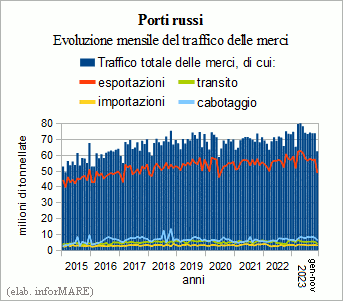
After the -2% decline last October, the following month
The decline in cargo traffic handled by Russian ports has
62.6 million tonnes, with a
-15% decrease on November 2022. The reduction was
generated by the contraction of cargo flows both in export and
and imports, which amounted to €49.1 million respectively.
tonnes (-15%) and 3.0 million tonnes (-9%), both of the
transit and cabotage traffic, amounting to €4.1 million
tonnes (-31%) and 6.4 million tonnes (-5%).
 The total of dry goods was 31.0 million
tonnes (-15%), of which 13.5 million tonnes of coal
(-25%), 4.1 million tonnes (+14%), 4.1 million tonnes
cereals (-29%), 3.3 million tonnes of fertilisers
minerals (+28%) and 1.6 million tonnes of ferrous metals
(+7%). Liquid bulk totalled 31.6 million
tonnes (-15%), including 19.7 million tonnes of oil
crude oil (-9%), 8.3 million tonnes of petroleum products
refined (-31%), 2.9 million tonnes of natural gas
liquefied (+4%) and 0.4 million tonnes of food products
(-20%).
The total of dry goods was 31.0 million
tonnes (-15%), of which 13.5 million tonnes of coal
(-25%), 4.1 million tonnes (+14%), 4.1 million tonnes
cereals (-29%), 3.3 million tonnes of fertilisers
minerals (+28%) and 1.6 million tonnes of ferrous metals
(+7%). Liquid bulk totalled 31.6 million
tonnes (-15%), including 19.7 million tonnes of oil
crude oil (-9%), 8.3 million tonnes of petroleum products
refined (-31%), 2.9 million tonnes of natural gas
liquefied (+4%) and 0.4 million tonnes of food products
(-20%).
If traffic in the ports of the Caspian Sea basin is
stable result of 0.7 million tonnes
the volumes of goods handled by the ports of call of the
other regions of Russia has declined, with the ports of the Sea
Baltic, which in November 2023 handled 19.5 million
tonnes (-10%), those from the Far East 18.4 million
tonnes (-5%), the ports of the Sea of Azov-Black Sea 16.2 million
tonnes (-33%) and ports in the Arctic basin 7.8 million tonnes.
tonnes (-3%).
In the first eleven months of 2023, Russian ports handled
811.9 million tonnes of cargo, with a
increase of +5.7% over the same period last year.